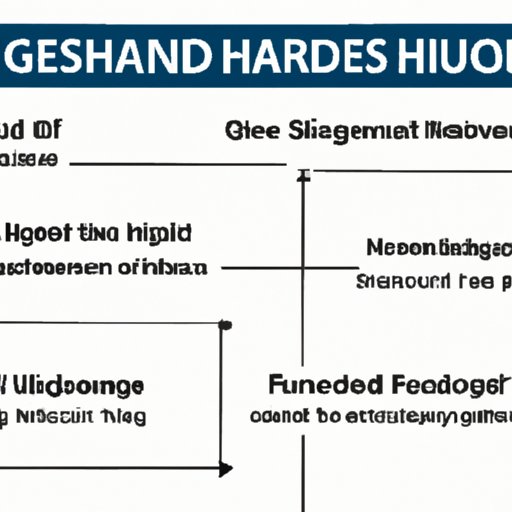Introduction
Hedge funds are alternative investments that can provide investors with access to unique opportunities and potentially higher returns. But how do hedge funds actually work? This article will provide an overview of how hedge funds operate and what you need to know before investing in one.

Overview of Hedge Fund Basics
Hedge funds are private investment vehicles open only to accredited investors or those with significant net worth. They are typically managed by experienced professionals who employ sophisticated investment strategies to generate returns. There are many different types of hedge funds, each with its own structure and strategy.

Different Types of Hedge Funds
Hedge funds can be divided into several broad categories based on their investment strategies. These include long/short equity, event driven, global macro, fixed income arbitrage, multi-strategy, and relative value.
Structure of Hedge Funds
Hedge funds are structured as limited partnerships or limited liability companies, with the general partner (GP) responsible for managing the fund’s investments and the limited partners (LPs) providing capital. The GP is typically compensated through both a management fee and a performance fee, while the LPs share in any profits generated by the fund.
Investment Strategies
Hedge funds employ a variety of investment strategies to generate returns. These may include leverage, short selling, derivatives, and hedging. Leverage involves borrowing money to increase the size of the fund’s positions, while short selling involves selling borrowed securities in anticipation of a price decline. Derivatives are financial instruments whose value is derived from underlying assets, while hedging is the use of offsetting positions to reduce risk.
Exploring Different Types of Hedge Funds
Long/Short Equity: Long/short equity hedge funds typically invest in stocks, taking both long and short positions in order to benefit from both rising and falling markets. These funds tend to have higher volatility than other types of hedge funds.
Event Driven: Event driven hedge funds focus on corporate events such as mergers, acquisitions, and bankruptcies. These funds seek to capitalize on pricing anomalies that arise from these events.
Global Macro: Global macro hedge funds employ a top-down approach to investing, analyzing global macroeconomic trends to identify potential investment opportunities. These funds often employ leverage to amplify returns.
Fixed Income Arbitrage: Fixed income arbitrage hedge funds seek to capitalize on pricing discrepancies between related bonds. These funds typically employ leverage to increase their exposure to the market.
Multi-Strategy: Multi-strategy hedge funds use a variety of investment strategies, including long/short equity, event driven, and global macro. These funds aim to generate returns regardless of market conditions.
Relative Value: Relative value hedge funds focus on exploiting mispricings between related assets, such as stocks and bonds. These funds typically employ leverage to increase their exposure to the market.
Examining Hedge Fund Strategies
Leverage: Leverage is commonly used by hedge funds to increase the fund’s exposure to the market. This allows the fund to magnify its gains, but it also increases the potential for losses should the market move against the fund’s positions.
Short Selling: Short selling involves selling borrowed securities in anticipation of a price decline. This allows the fund to profit from falling prices, but it also carries the risk of unlimited losses if the security’s price rises instead.
Derivatives: Derivatives are financial instruments whose value is derived from underlying assets such as stocks, bonds, and commodities. These instruments can be used to speculate on the direction of markets or to hedge against losses.
Hedging: Hedging is the use of offsetting positions to reduce risk. For example, a fund might take a long position in a stock while simultaneously taking a short position in a related stock in order to hedge against losses.

The Role of the Investment Manager
The investment manager plays a critical role in determining the success of a hedge fund. The manager is responsible for making investment decisions and allocating assets among different strategies and markets. The manager must also manage risk, monitor performance, and adjust the fund’s portfolio as needed.
Evaluating Hedge Fund Performance
When evaluating the performance of a hedge fund, investors should consider several factors. Benchmarking helps to compare the fund’s performance against that of similar funds, while risk/reward analysis measures the fund’s risk-adjusted returns. Fees and expenses should also be taken into account when assessing the fund’s performance.
Considerations for Investing in a Hedge Fund
Before investing in a hedge fund, investors should consider several factors. Accreditation requirements vary by jurisdiction and may restrict access to certain funds. Investors should also conduct due diligence to ensure the fund is suitable for their needs and understand the tax implications of investing in a hedge fund.
Conclusion
Hedge funds offer investors access to unique opportunities and the potential for higher returns. This article has provided an overview of how hedge funds work, from the different types of funds to their investment strategies and performance evaluation. It has also covered considerations for investing in a hedge fund, such as accreditation requirements, due diligence, and tax implications. Ultimately, investors should carefully evaluate any potential hedge fund investment before committing capital.
Final Thoughts
Hedge funds can be attractive investments for accredited investors looking to diversify their portfolios and access unique opportunities. However, they are complex investments and carry significant risks. Investors should always perform due diligence and understand the associated fees and tax implications before investing in a hedge fund.
(Note: Is this article not meeting your expectations? Do you have knowledge or insights to share? Unlock new opportunities and expand your reach by joining our authors team. Click Registration to join us and share your expertise with our readers.)
